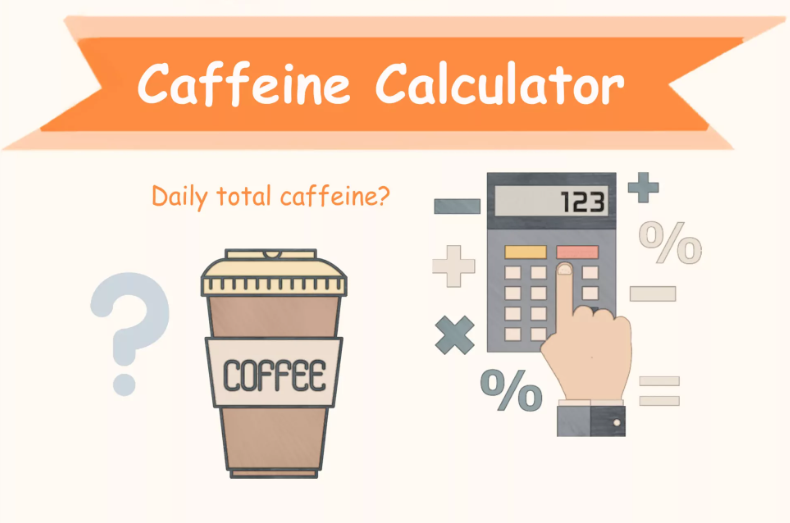Caffeine Daily Limit Calculator
Track your caffeine intake and stay within healthy limits
About Caffeine Limits
Health authorities recommend that most adults limit their caffeine intake to 400mg per day. Pregnant women should limit to 200mg, and teenagers to 100mg. Excessive caffeine can cause anxiety, sleep disturbances, heart palpitations, and other health issues.
Calculate Your Daily Intake
Your Caffeine Intake Results
Your total caffeine intake: 0 mg
Recommended daily limit: 400 mg
Status: Safe
Your Beverages:
Common Caffeine Sources
| Beverage | Serving Size | Caffeine (mg) |
|---|---|---|
| Brewed Coffee | 8 oz (240 ml) | 95 |
| Espresso | 1 oz (30 ml) | 63 |
| Black Tea | 8 oz (240 ml) | 47 |
| Green Tea | 8 oz (240 ml) | 28 |
| Cola | 12 oz (355 ml) | 34 |
| Energy Drink | 8 oz (240 ml) | 80 |
Introduction to the Daily Caffeine Limit Formula
Caffeine is a widely consumed stimulant found in coffee, tea, chocolate, and energy drinks. While moderate caffeine intake offers benefits such as increased alertness and improved concentration, excessive consumption can lead to health issues like insomnia, anxiety, and high blood pressure.
Formula Explanation:
This tool is based on guidelines from the National Institutes of Health (NIH) and other health authorities, recommending a maximum safe caffeine intake of 6 mg per kilogram of body weight per day.
Formula:
- Daily Caffeine Limit (mg) = Body Weight (kg) × 6 mg
- If weight is entered in pounds (lbs), the tool automatically converts it using: 1 kg = 2.20462 lbs
- An average cup of coffee contains about 95 mg of caffeine.
Example Caffeine calculator:
If you weigh 70 kg, your safe daily caffeine intake would be: 70 kg × 6 mg = 420 mg (~4 cups of coffee).
Important Notes:
Exceeding the recommended limit can lead to side effects like restlessness, headaches, and rapid heart rates. This tool helps you maintain a balanced and healthy caffeine consumption tailored to your body weight.
List of popular teas and coffees from Vietnam, Europe, the U.S., and Canada, along with their average caffeine.
Coffee:
Vietnam:
- Vietnamese Drip Coffee (Cà phê phin): Approximately 80-100 mg of caffeine per cup (100 ml).
- Vietnamese Iced Milk Coffee (Cà phê sữa đá): Approximately 80-100 mg of caffeine per cup (100 ml).
- Vietnamese Egg Coffee (Cà phê trứng): Approximately 80-100 mg of caffeine per cup (100 ml).
Europe:
- Espresso (Italy): Approximately 63 mg of caffeine per shot (30 ml).
- Cappuccino (Italy): Approximately 63-125 mg of caffeine per cup (240 ml).
- Café au Lait (France): Approximately 60-100 mg of caffeine per cup (240 ml).
- Latte Macchiato (Italy): Approximately 63-125 mg of caffeine per cup (240 ml).
U.S. and Canada:
- Americano: Approximately 80-120 mg of caffeine per cup (240 ml).
- Cold Brew: Approximately 100-200 mg of caffeine per cup (240 ml).
- Drip Coffee: Approximately 95-200 mg of caffeine per cup (240 ml).
- Iced Coffee: Approximately 80-100 mg of caffeine per cup (240 ml).
Tea:
Vietnam:
- Black Tea: Approximately 40-70 mg of caffeine per cup (240 ml).
- Green Tea: Approximately 20-45 mg of caffeine per cup (240 ml).
- Jasmine Tea: Approximately 25-50 mg of caffeine per cup (240 ml).
Europe:
- English Breakfast Tea (UK): Approximately 40-70 mg of caffeine per cup (240 ml).
- Earl Grey (UK): Approximately 40-70 mg of caffeine per cup (240 ml).
- Chai Tea (India/UK): Approximately 40-60 mg of caffeine per cup (240 ml).
U.S. and Canada:
- Green Tea: Approximately 20-45 mg of caffeine per cup (240 ml).
- Iced Tea: Approximately 20-50 mg of caffeine per cup (240 ml).
- Herbal Tea: Virtually no caffeine.
- Matcha Latte: Approximately 70 mg of caffeine per cup (240 ml).
Notes:
- Caffeine content can vary depending on the type of coffee bean, tea leaf, brewing method, and steeping time.
- Caffeine is also found in other beverages like energy drinks, soda, and chocolate.
